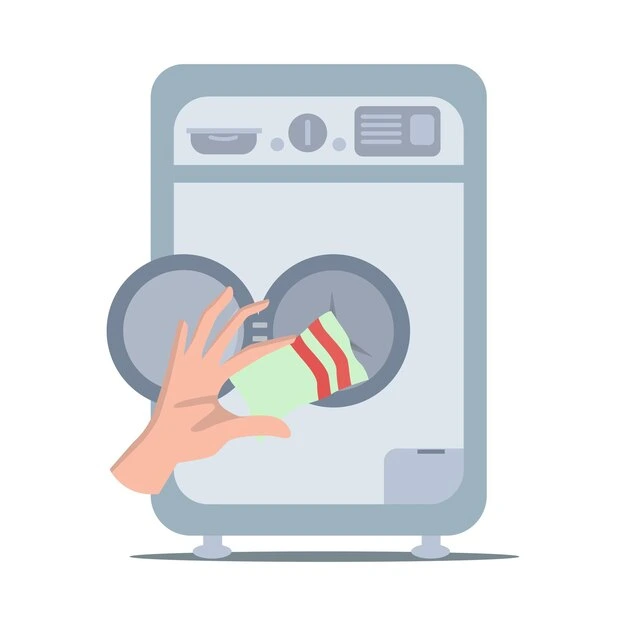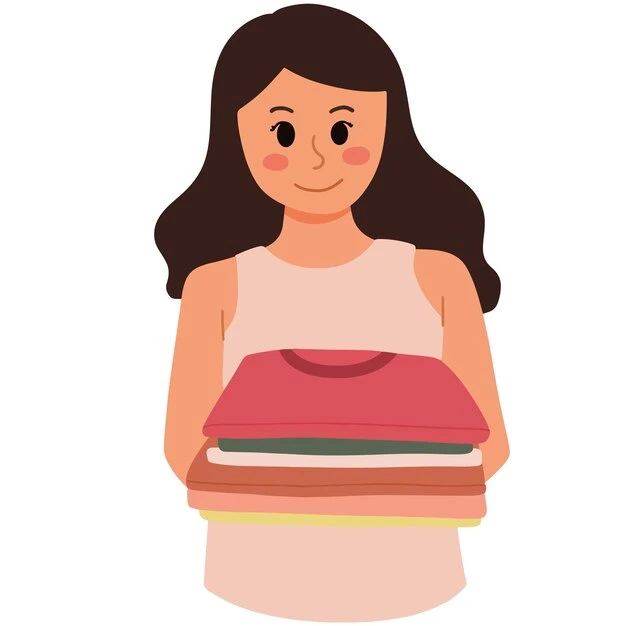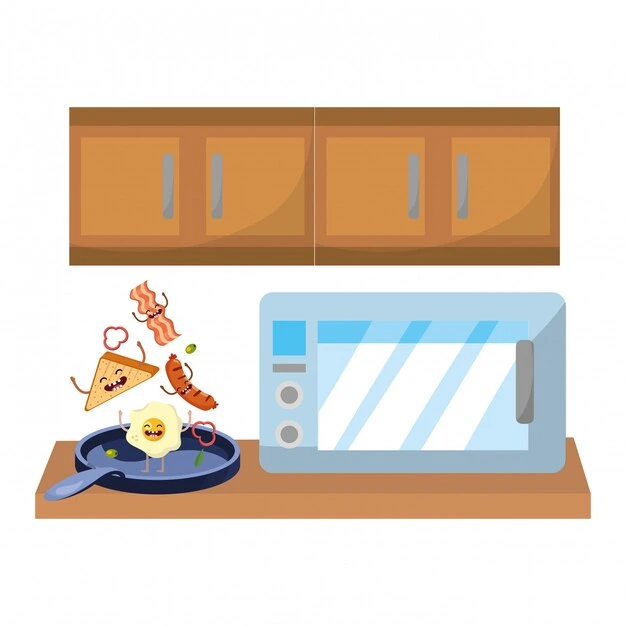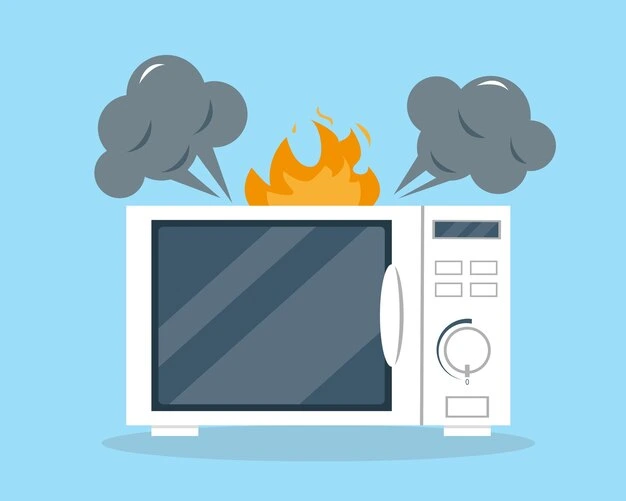Yes, you can safely put a towel in the microwave for a short amount of time. Putting a towel in the microwave can be convenient for warming it up before use or using it as a heating pad.
However, it’s important to exercise caution and follow some guidelines to avoid potential risks. This article will discuss the safety precautions for microwaving towels, their potential uses, and what materials to avoid. Whether you’re looking to warm up a towel for comfort or practical purposes, read on to learn how to do it safely.
- 1 The Dangers Of Microwaving Towels
- 2 Why Do People Want To Microwave Towels?
- 3 The Heat Conduction Properties Of Towels
- 4 Understanding Microwaves And Their Effects On Towels
- 5 The Role Of Moisture In Microwaving Towels
- 6 Fire Hazards And Microwaving Towels
- 7 Are There Safe Alternatives For Warming Towels?
- 8 Frequently Asked Questions Of Can You Put A Towel In The Microwave
- 9 Conclusion
The Dangers Of Microwaving Towels

Microwaving towels can pose serious dangers, as it can lead to fire or burns. Avoid using the microwave for towels to prevent accidents and ensure safety in your home.
**Microwaving towels can cause fires:**
- Placing a towel in the microwave can lead to a potential fire hazard due to several reasons:
- Improper placement: When a towel is folded or bunched up, it can create hotspots within the microwave, increasing the risk of igniting and causing a fire.
- Combustible materials: If the towel contains any flammable substances like oil, grease, or cleaning agents, the high heat of the microwave can easily set it ablaze.
- Overheating: Microwaving a towel for an extended period or at high power settings can cause the fabric to exceed its ignition temperature, thus igniting a fire.
**Microwaving towels can release harmful chemicals:**
- When a towel is heated in the microwave, it can release harmful chemicals and pose health risks:
- Off-gassing: Some towels may contain chemical residues from manufacturing processes or laundry detergents. Microwaving these towels can cause these chemicals to evaporate and be released into the air, which can be hazardous if inhaled.
- Contamination: If a towel has been used to clean up chemicals, pesticides, or other toxic substances, microwaving it can vaporize these contaminants, leading to air pollution within your home.
- Melting of synthetic fibers: Many towels are made from synthetic fabrics that can melt when exposed to high heat. The melted fibers can release toxic fumes, causing harm to your health.
Remember, it is important to prioritize safety and avoid microwaving towels. Always refer to the manufacturer’s guidelines and use the microwave for its intended purposes. Stay cautious and minimize the risk of accidents and potential harm caused by microwaving towels.
Stay safe and strive for responsible microwave usage.
Why Do People Want To Microwave Towels?

Microwaving towels is a common practice as it helps to provide warmth and comfort. It can be used to soothe muscles, relieve pain, or simply create a cozy feeling on a chilly day. However, caution should be exercised to prevent overheating or fire hazards.
Microwaving towels might sound like an unusual concept, but many people are intrigued by the idea. Whether it’s for practical reasons or simply out of curiosity, there are several common motivations that drive people to consider microwaving towels. Let’s explore these reasons and also debunk any misconceptions about microwaving towels.
Common Reasons People Consider Microwaving Towels:
- Warmth and comfort: One of the primary reasons people want to microwave towels is to warm them up and create a cozy experience. Heat can provide soothing relief for tired muscles, promote relaxation, and offer comfort during colder seasons.
- Pain relief: Microwaving towels can provide temporary relief from aches and pains. By applying a warm towel to a specific area of the body, individuals hope to alleviate muscle soreness, joint stiffness, or menstrual cramps.
- Moist heat therapy: Some individuals resort to microwaving towels to benefit from moist heat therapy. By adding a small amount of water to the towel before heating, they aim to enhance the therapeutic effect, as moist heat penetrates the skin more effectively.
- Imitating spa treatments: Many spas and beauty salons use warm towels as part of their treatments. People who enjoy pampering themselves may want to recreate the spa experience at home by warming towels in their microwave.
- Quick drying: In certain situations, people might consider microwaving towels to expedite the drying process. This could be useful if they are in a rush and need a dry towel immediately.
Exploring The Misconceptions About Microwaving Towels:
- Fire hazard: Concerns about fires or overheating can discourage some individuals from microwaving towels. It’s important to note that as long as the towel is damp and not left unattended for an excessive amount of time, the risk of fire is minimal. However, caution should always be exercised when using a microwave.
- Damage to the microwave: Another misconception is that microwaving towels can damage the microwave itself. While it is true that inappropriate use, such as microwaving dry or heavily soiled towels, can potentially damage the appliance, microwaving a damp towel for a short period is generally safe.
- Reduced towel lifespan: Some worry that microwaving towels could shorten their lifespan. The truth is, that microwaving towels occasionally and following proper guidelines should not have a significant impact on their durability or longevity.
Microwaving towels can serve various purposes, from providing warmth and comfort to easing discomfort in a natural and convenient way. As long as precautions are taken and common misconceptions are debunked, microwaving towels can be a safe and beneficial practice for many individuals.
The Heat Conduction Properties Of Towels

Towels have poor heat conduction properties, so putting them in the microwave may not be a good idea.
Understanding How Towels Absorb And Retain Heat
Towels are not only useful for drying off, but they also possess unique properties when it comes to heat conduction. To fully comprehend the heat-conduction properties of towels, it is important to understand how they absorb and retain heat.
Here’s what you need to know:
Factors That Affect Heat Conduction In Towels:
When it comes to heat conduction in towels, various factors come into play. These factors can influence the towel’s ability to absorb and transfer heat effectively. Let’s explore them:
- Material composition: Different materials have different heat conduction properties. While cotton towels are known for their excellent absorbency, other materials like microfiber may have different levels of effectiveness in heat conduction.
- Thickness and density: Towels with a thicker and denser weave tend to have better heat conduction properties. The increased thickness allows for better insulation and heat retention.
- Moisture content: Moisture can affect the heat conduction properties of a towel. A damp towel may conduct heat differently compared to a dry one.
- Surface area: The larger the surface area of a towel, the greater its potential for heat absorption and conduction. This is why larger towels are often more effective in retaining heat.
- Wrapping technique: The way a towel is wrapped or folded can impact its heat conduction properties. Wrapping a towel tightly around an object can promote heat transfer, while loose wrapping may hinder it.
- Age and condition: Over time, towels may lose their ability to absorb and retain heat due to wear and tear. Older towels or those with worn-out fibers may not be as effective in conducting heat.
Understanding these factors can help you make informed decisions about using towels in specific heating applications. Whether you’re using a towel in the microwave or for other heat-related tasks, considering these aspects can ensure optimal results.
Understanding Microwaves And Their Effects On Towels

Microwaving towels can have varied effects due to the nature of microwaves. Understanding the potential risks and benefits is crucial before attempting this method.
Microwaving towels may seem like a convenient way to warm them up before use or to provide some much-needed heat during the colder months. However, it’s important to understand the impact that microwaves can have on towels. In this section, we will explore how microwaves work and why microwaving towels can be problematic.
How Microwaves Work And Their Impact On Towels:
- Microwaves are a form of electromagnetic radiation that operates at a frequency range of 300 MHz to 300 GHz.
- When you place a towel in the microwave, the moisture present in the fabric absorbs the microwaves.
- As the microwaves are absorbed, the water molecules within the towel begin to vibrate, generating heat. This is how microwaves effectively heat food.
- However, towels are not designed to absorb and dissipate heat as efficiently as food items.
- The uneven distribution of heat within the towel can lead to specific areas becoming excessively hot, potentially causing burns or fire hazards.
- Additionally, towels may contain synthetic fibers or components such as decorative trims or embellishments that are not microwave-safe, which can result in adverse reactions when exposed to microwaves.
Microwaving towels can be problematic due to the potential risks involved and the fact that towels are not designed to be heated in this manner. From fire hazards to potential damage to the towel itself, it’s important to exercise caution when considering microwaving towels.
The Role Of Moisture In Microwaving Towels
Moisture plays a crucial role in microwaving towels, as it helps ensure even heat distribution for effective warming. By adding a small amount of water to the towel before placing it in the microwave, you can avoid the risk of scorching or starting a fire.
Have you ever wondered if it’s safe to put a damp towel in the microwave? Moisture plays a crucial role in the heating process when it comes to microwaving towels. Understanding how moisture affects this process is important to ensure safety and prevent potential risks.
Let’s delve into the details:
How Moisture Affects The Heating Process In The Microwave:
- Moisture absorbs microwave energy: When a towel is damp, the water molecules within it absorb the microwave energy, converting it into heat. This leads to more efficient heating compared to dry towels.
- Increased heating time: Due to moisture absorption, damp towels require a longer heating time than dry ones. The moisture needs time to absorb the microwave energy and generate heat, which ultimately warms the towel.
- Enhanced evaporation: Moisture within the towel evaporates during microwaving. This evaporation contributes to further heating as the water molecules convert into steam, adding an extra source of heat.
The Potential Risks Of Microwaving Damp Towels:
- Hot spots and burns: Uneven distribution of moisture within the towel can create hot spots during microwaving. These hot spots can lead to burns when you touch or handle the towel immediately after microwaving.
- Fire hazards: Excessive moisture or prolonged heating can cause the towel to catch fire, presenting a serious fire hazard. It is essential to monitor the towel closely while microwaving it to prevent any such incidents.
- Bacterial growth: Moisture provides an ideal breeding ground for bacteria. Microwaving damp towels might not eliminate all bacteria, especially if the heating isn’t thorough or for an appropriate duration. This can lead to the spread of harmful bacteria and potential health risks.
To ensure safety and avoid the above risks, it is generally recommended to follow these guidelines:
- Use a microwave-safe container: Always place the damp towel in a microwave-safe container or on a microwave-safe plate to prevent any damage to the microwave or the towel.
- Monitor the heating time: Be mindful of the heating time to prevent overheating the towel, leading to burns or fire hazards.
- Allow time to cool down: After microwaving, let the towel cool down for a short period before handling or using it.
- Prioritize cleanliness: Ensure the towel is clean and free of any contaminants before microwaving. Regularly wash and dry towels to prevent bacterial growth.
By understanding the role of moisture in microwaving towels and being cautious about potential risks, you can confidently and safely warm your towels in the microwave when needed. Remember to always prioritize safety and follow the recommended guidelines.
Fire Hazards And Microwaving Towels

Microwaving towels can pose fire hazards, as they can overheat and catch fire due to the high risk of ignition. It is important to avoid putting towels in the microwave to prevent potential accidents and damage.
The Dangers Of Overheating Towels In The Microwave
Did you know that microwaving towels can be a potential fire hazard? While it may seem like a quick and convenient way to warm up your towels, there are certain risks involved that you need to be aware of. Let’s delve into the dangers of overheating towels in the microwave and learn how to mitigate the risk of fires.
Steps To Prevent Fires When Using Microwaves And Towels:
Here are some precautions to keep in mind to ensure your towel-warming ventures remain safe:
- Check for metal components: Before putting any towel in the microwave, thoroughly inspect it for any metal components such as buttons or zippers. These metallic parts can cause sparks that may ignite a fire when exposed to microwaves.
- Avoid wet or damp towels: Always ensure that the towel you are microwaving is completely dry. Wet or damp towels can create steam pockets within the fibers, increasing the risk of fire.
- Time and temperature control: Be cautious about the duration and temperature setting when microwaving towels. Overheating can lead to smoldering or even ignition of the fabric. Start with short bursts of 15-20 seconds and gradually increase the time if necessary.
- Monitor the process: While the towel is inside the microwave, keep an eye on it to spot any signs of smoke, burning, or unusual odors. If you notice any of these warning signs, stop the microwave immediately and remove the towel.
- Fire safety precautions: Always have a fire extinguisher within reach in case of emergencies. Additionally, ensure that your microwave is located in a well-ventilated area, away from flammable materials.
By following these steps and being mindful of the potential fire hazards, you can safely warm up your towels in the microwave without any risk of fires. Remember, fire safety should always be a priority, even in small everyday tasks like heating up your towels.
Stay safe and enjoy the warmth of freshly warmed towels without any worries!
Are There Safe Alternatives For Warming Towels?
Looking for a safe alternative to warm towels? Find out if microwaving towels is a good idea and explore other options for cozy, heated towels.
Safer Methods For Warming Towels Without Using A Microwave
Many of us enjoy the comfort of warm towels, especially during the colder months or after a long bath or shower. However, microwaving towels may not always be the safest option. Fortunately, there are alternative methods available that can still provide that cozy warmth without the potential risks.
In this section, we will explore these safer alternatives for warming towels.
Benefits Of Using Alternative Methods For Towel Warming
When it comes to warming towels, there are several safer options to consider. Let’s take a look at the benefits of these alternative methods:
- Hot towel cabinets: These specialized cabinets are designed to safely warm and maintain the temperature of towels. They use a controlled heat source, ensuring that the towels are warm and cozy without any overheating or potential hazards.
- Towel warmers: Electric towel warmers are another great option. They are specifically designed to warm towels and keep them at a comfortable temperature. With a variety of sizes and styles available, you can easily find one that suits your needs and complements your bathroom decor.
- Radiant heat flooring: If you’re considering a bathroom remodel, installing radiant heat flooring can be a luxurious and efficient way to warm not only your towels but also your entire bathroom. This system uses heated coils beneath the floor surface to provide consistent warmth throughout the room.
- Heated towel racks: These racks come in various styles and can be easily installed in your bathroom. They provide a dedicated space to hang your towels, which are then gently warmed by the rack’s heating elements. Heated towel racks are energy-efficient and can add a touch of luxury to your bathroom.
- Water towel warmers: If you prefer a more eco-friendly option, water towel warmers utilize hot water from your household’s plumbing system to warm your towels. This method is energy-efficient and ensures a steady supply of warm towels whenever you need them.
By exploring these alternative methods for warming towels, you can enjoy the benefits of warm and cozy towels without the potential risks associated with microwaving. Choose the method that best suits your needs and indulge in the comfort and relaxation of a warm towel after your next bath or shower.
Frequently Asked Questions Of Can You Put A Towel In The Microwave
How Do You Heat Towels In The Microwave?
To heat towels in the microwave, place them in a microwave-safe container and heat them on high for 1-2 minutes.
Can You Put Cloth In The Microwave?
No, it is not safe to put cloth in the microwave as it can pose a fire risk.
Can You Microwave Dry Towels?
No, it’s not recommended to microwave dry towels because it can be a fire hazard.
Can You Microwave A Towel For A Heating Pad?
Yes, you can microwave a towel for a heating pad.
Conclusion
While the idea of putting a towel in the microwave may seem like a convenient solution, it is important to consider the potential risks involved. Microwaving a towel can lead to a fire hazard, damage to the microwave, and the release of harmful chemicals.
Additionally, the heat generated by the microwave can cause burns if the towel is too hot when removed. It is best to avoid putting towels or any other non-food items in the microwave to ensure the safety of both yourself and your appliance.
If you need to warm up a towel, a safer alternative is to use a towel warmer or simply soak the towel in hot water. Prioritizing safety and good microwave practices will help prolong the lifespan of your microwave and prevent accidents.

